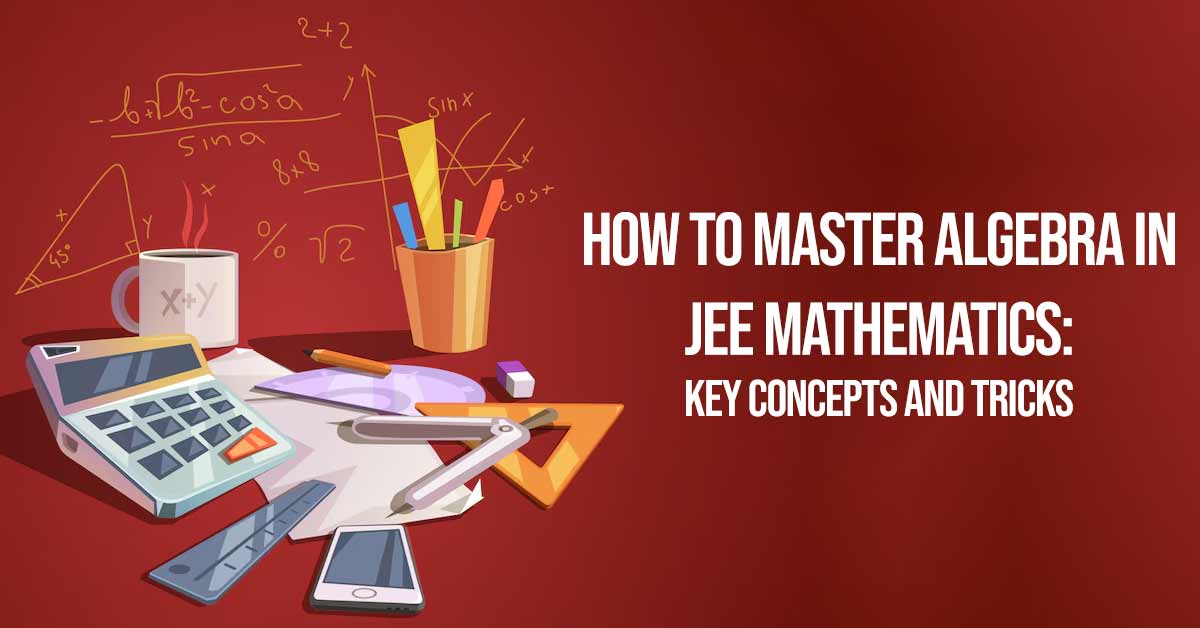Algebra is a cornerstone of JEE Mathematics and a subject that can significantly influence your overall score in the JEE exams. For JEE aspirants enrolled in JEE Coaching in Chennai, mastering algebra not only builds a solid foundation for more complex topics in mathematics but also helps enhance logical thinking and problem-solving skills. Here’s a comprehensive guide to mastering algebra for JEE, covering key concepts, strategies, and tricks to approach the subject efficiently.
1. Understanding The Core Concepts
A strong grasp of algebraic fundamentals is the first step to success in JEE Mathematics, especially for students enrolled in top JEE Coaching Centre Chennai programs. Here are the main areas to focus on:
- Quadratic Equations: Quadratic equations form the bedrock of algebra in JEE. Knowing how to factorize, apply the quadratic formula, and understand the nature of roots (real, imaginary, equal) will allow you to solve a wide range of problems.
- Inequalities: Many JEE problems require a thorough understanding of inequalities. Learn the standard methods to solve inequalities, including quadratic inequalities, modulus-based inequalities, and inequalities involving rational expressions.
- Sequences and Series: Topics like Arithmetic Progression (AP), Geometric Progression (GP), Harmonic Progression (HP), and other series such as the sum of squares and cubes are crucial. Be clear on formulas, and practice how to apply them across different problems, especially those typically found at the best JEE Coaching in Chennai.
- Logarithms and Exponentials: Exponentials and logarithms appear frequently in JEE mathematics problems. Familiarize yourself with the properties of logarithms, such as product, quotient, and power rules, and be able to switch between exponential and logarithmic forms.
- Binomial Theorem: The binomial theorem is often considered one of the trickiest topics in algebra. Focus on understanding the expansion formula, properties of binomial coefficients, and applications like middle term and greatest term in binomial expansion.
- Complex Numbers: Complex numbers are an integral part of JEE algebra, especially when dealing with polynomials. Make sure you’re comfortable with the basics, including addition, multiplication, modulus, argument, and representation on the complex plane.
2. Key Tricks To Simplify Algebraic Problems
Once you have a clear understanding of the foundational topics, adopt specific tricks and strategies to solve algebraic problems faster and more accurately.
Trick #1: Use Substitution Wisely
Substitution is one of the most efficient techniques in algebra. If you encounter an equation that looks complex, try substituting terms to simplify the expression. For instance, in problems with terms like (x+y)(x+y)(x+y) and (x−y)(x-y)(x−y), substituting these expressions with variables like uuu and vvv can make the problem more manageable.
Trick #2: Leverage Symmetry in Equations
In many algebraic problems, especially in polynomials, symmetry can be a valuable tool. Symmetry refers to equations or terms that remain the same even if you interchange certain variables or terms. Recognizing symmetry can reduce the amount of calculation you need to do, saving time and improving accuracy.
Trick #3: Simplify by Factorization
Factorization is a powerful tool for breaking down complex algebraic expressions into simpler parts. This is especially useful in quadratic equations, polynomial equations, and expressions involving multiple variables. Factor out common terms or use techniques like the difference of squares and sum/product of roots to simplify the expression.
Trick #4: Remember the Standard Formulas
JEE exams require quick problem-solving, and memorizing standard algebraic formulas can speed up your solutions. Formulas such as those for sum of n natural numbers, sum of squares, sum of cubes, and binomial expansion can save valuable time. Regularly review these formulas to keep them fresh in your mind.
Trick #5: Apply Graphical Interpretation for Inequalities
Graphical methods are invaluable for solving inequalities. Visualizing inequalities on a number line or a graph can simplify complex questions and help you quickly identify the range of possible solutions. For quadratic inequalities, sketching the parabola can provide insights into where the function is positive or negative.
3. Common Pitfalls And How To Avoid Them
Even with strong knowledge and practice, students can make simple errors. Here’s how to avoid some common mistakes in algebra:
- Avoid Over-Complicating Problems: Many students tend to overthink problems, leading to unnecessary calculations. Before you start, analyze the problem for possible shortcuts or simplifications.
- Double-Check Sign Errors: Algebra problems often involve negative signs, and a simple sign error can lead to incorrect answers. Be cautious with negative numbers, especially in complex calculations or long expressions.
- Manage Time Effectively: Algebra can be time-consuming if you’re not efficient. Practice solving problems with a timer, so you become accustomed to working under time pressure.
4. Practice, Practice, Practice
The most effective way to master algebra for JEE is consistent and focused practice. Here are some recommended methods:
- Solve Previous Year’s JEE Questions: Practicing with actual JEE questions familiarizes you with the format and difficulty level, helping you refine your strategies for different types of problems.
- Take Mock Tests Regularly: Mock tests provide a realistic sense of the exam environment and help you manage your time more effectively. Review your mistakes in these tests to identify areas for improvement.
- Focus on Mixed Question Sets: Algebra questions often require using multiple concepts within a single problem. Mixed question sets, combining quadratics, inequalities, and complex numbers, for example, will give you the chance to practice integrating multiple skills.
5. Stay Calm And Confident
Lastly, maintaining a calm and positive mindset is essential for JEE preparation. Algebra problems can sometimes seem intimidating, but with the right approach and mindset, you can tackle even the most challenging questions. Remember, consistent effort and a methodical approach are key to mastering algebra.
Mastering algebra in JEE Mathematics requires a balance of strong foundational knowledge, strategic tricks, and extensive practice. By focusing on core concepts, employing efficient problem-solving techniques, and avoiding common mistakes, you’ll be well-prepared to tackle any algebra question on the JEE. Start early, practice regularly, and stay positive—algebra mastery is within your reach!

